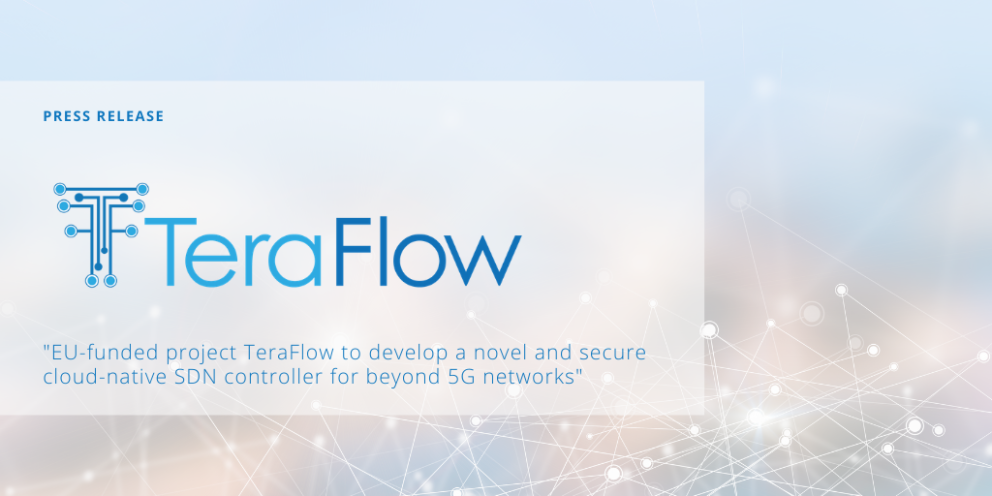EU-funded project TeraFlow to develop a novel and secure cloud-native SDN controller for beyond 5G networks
Due to its multiple benefits, the technologies developed during the 30-month project mainly target telecom operators, edge and hyper-scale cloud providers
Castelldefels, Spain. February 11, 2021. TeraFlow project, funded by the European Commission under Horizon 2020 Programme, officially started on January 1st as part of the 5GPPP Phase 3 projects working on the topic of Smart Connectivity beyond 5G. The project aims to build a new type of secure cloud-native SDN controller that will drastically transform Beyond 5G (B5G) networks by integrating current NFV and MEC frameworks and revolutionary features for flow management at the service layer, and optical/microwave network equipment integration at the infrastructure layer. On top of that, TeraFlow envisions to enhance the security of its controller by using Machine Learning (ML) and forensic evidence for multitenancy based on Distributed Ledgers.
In a context where the networks are exponentially increasing due to 5G, 3GPP releases and upcoming B5G networks, there is a latent need for massive flow management combined with advanced automation capabilities as human management and operation of the networks will become more challenging. However, even when Software Defined Networks (SDN) have the capabilities to fulfil those requirements, current SDN controllers have limitation in terms of flow aggregation and software architecture, which at the same time influences the slow adoption of basic SDN deployments from networks operators.
To tackle all these challenges, TeraFlow proposes an architecture for a cloud-native SDN controller aiming at capabilities and deployments for B5G with high levels of reliability, redundancy and security built upon three main pillars: autonomous networks and compute integration, trusted multi-tenancy, and ML-based cybersecurity.
Consequently, TeraFlow architecture is based on container-based services deployed as microservices and managed on elastic infrastructures through agile DevOps process and continuous delivery workflows for providing benefits such as:
- Self-healing properties due to the constant monitoring of microservices and their restart in case of failure
- Auto-scaling, allowing monitor microservices’ resource consumption and scaling horizontally in case of overload
- Load balancing for replicated microservices
- Automated rollbacks allowing a declarative network status description for additional network programmability benefiting network operators
TeraFlow OS will be validated on three scenarios: Autonomous Networks B5G, Automotive and Cybersecurity.
The project is coordinated by the Centre Tecnològic de Telecomunicacions de Catalunya (CTTC) and brings together other 13 partners from 8 countries with different areas of expertise for the development of TeraFlow OS and other relevant tasks for experimental implementation and demonstration of prototypes, collaboration with Standard Defining Organisations and Open source software community, 5GPPP, and the definition of a sustainability roadmap for the results generated.
The partners are Telefónica Investigación y Desarrollo (Spain), INFINERA (Finland), SIAE Microelettronica (Italy), NEC Laboratories (Germany), Atos (Spain), Telenor (Norway), Chalmers University (Sweden), Universidad Politecnica de Madrid (Spain), Volta Networks (Spain), Norwegian University of Science and Technology - NTNU (Norway), UBITECH (Greece), Peer Stritzinger (Germany) and Old Dog Consulting (UK).
Quotes:
“TeraFlow will have a strong impact on how SDN controllers are currently defined and implemented. We expect to lead a new era of innovation in software-defined networks and foster a new generation of SDN controllers” Ricard Vilalta, Senior Researcher at CTTC and TeraFlow Project Coordinator.
“Telefónica’s iFUSION strategy is designed to create a highly agile and cost-efficient transport network to support today’s traffic demands, as well as beyond 5G traffic volumes and use cases, such as network slicing. The large ecosystem in Teraflow’s project will help us to achieve new and more dynamic network services and automation features validated in representative scenarios” Victor Lopez, Network Evolution and Virtualisation Architect at Telefónica Investigación y Desarrollo, and TeraFlow Technical Manager.
________
For more information, visit: www.teraflow-h2020.eu
Follow TeraFlow on Twitter and LinkedIn, and subscribe to its newsletter for being up to date with all the progress
About TeraFlow:
TeraFlow – Secured autonomic traffic management for a Tera of SDN flows - is an EU-funded project under the Research and Innovation programme H2020 with the Grant Agreement Nº 101015857. TeraFlow will create a new type of secure cloud-native SDN controller that will radically advance the state-of-the-art in beyond 5G networks.
For further information about the project please contact TeraFlow Project Coordinator, Ricard Vilalta, CTTC: ricard.vilalta@cttc.es
Other press releases:
- 11 February 2021 - EU-funded project TeraFlow to develop a novel and secure cloud-native SDN controller for beyond 5G networks
- 23 February 2022 - TeraFlow project launches the 1st release of a software-defined cloud-native SDN controller providing capabilities and deployments of Beyond 5G networks
- 31 May 2022 - ETSI launches a new open-source group: TeraFlowSDN
- 7 December 2022 - ETSI TeraFlowSDN Winner of the Layer123 Network Transformation ‘Upstart of the Year’ Award
- 2 February 2023 - ETSI launches second release of TeraFlowSDN, its open source Cloud-Native SDN Orchestrator and Controller for transport networks
- 22 February 2023 - ETSI TeraFlowSDN to serve as reference implementation for TIP
- 14 July 2023 - TeraFlow Introduces TeraFlowSDN 2.1: A Major Leap in Software-Defined Networking
- 25 July 2023 - TeraFlowSDN will collaborate with OpenSlice, the first ETSI SDG to deliver Network Slice as a Service
